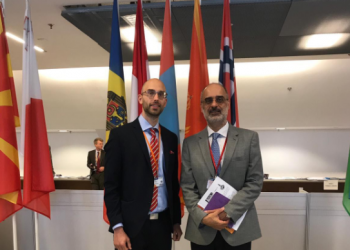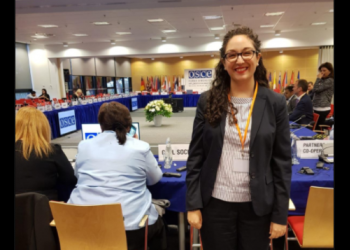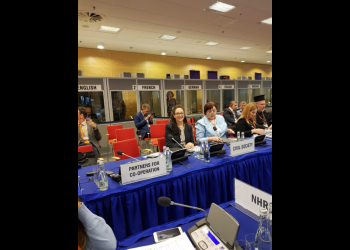BIC calls to foster an understanding of a common identity at annual Human Dimension Implementation meeting
Europe's largest annual human rights and democracy conference, the Human Dimension Implementation Meeting (HDIM), organized every year by the Organization for Security and Cooperation in Europe (OSCE) took place this year from 16 to 27 September in Warsaw, Poland. Fifty-seven countries were joined by civil society actors and other OSCE structures committed to the promotion of human rights.
Two representatives from the Baha’i International Community’s Brussels Office, Ms. Nura Detweiler and Mr. Jeff Simon, attended sessions on freedom of religion or belief, and on tolerance and non-discrimination.
The UN Special Rapporteur on Freedom of Religion or Belief, Dr. Ahmed Shaheed, introduced the session on freedom of religion or belief (FoRB), after which Ms. Detweiler opened up the contributions from civil society, stating on behalf of the Baha’i International Community, that “We believe that one key element in upholding FoRB is to encourage various religious or belief and non-belief communities to do their utmost to get to know each other so that individuals belonging to one community can better understand the profoundness of thought and belief of another community.”
“Ignorance that leads to religious prejudice can best be overcome if at all levels, from the grassroots to the leadership level, religious communities are encouraged to interact with each other and find ways to work together” noted Ms. Detweiler.
During the second session on tolerance and non-discrimination, Mr. Simon addressed those present by calling their attention to the current reality. Mr. Simon conveyed the idea that a vision of a shared identity and common purpose is vital at the present juncture and that the world, including Europe, is today undoubtedly gripped by a crisis of identity. The emergence of ever more narrow and opposing group identities are leading our societies to becoming increasingly fragmented. We need a conception of human identity which is embedded in the recognition that humanity is one and that humanity is on a common journey in which we all are protagonists.
In this light, Mr Simon encouraged the OSCE to “explore how spaces can be created at the local or national level, whether informal or institutional, where peoples of all ages, and especially children and youth, can come to an understanding of a common, rather than a fragmented identity.”





